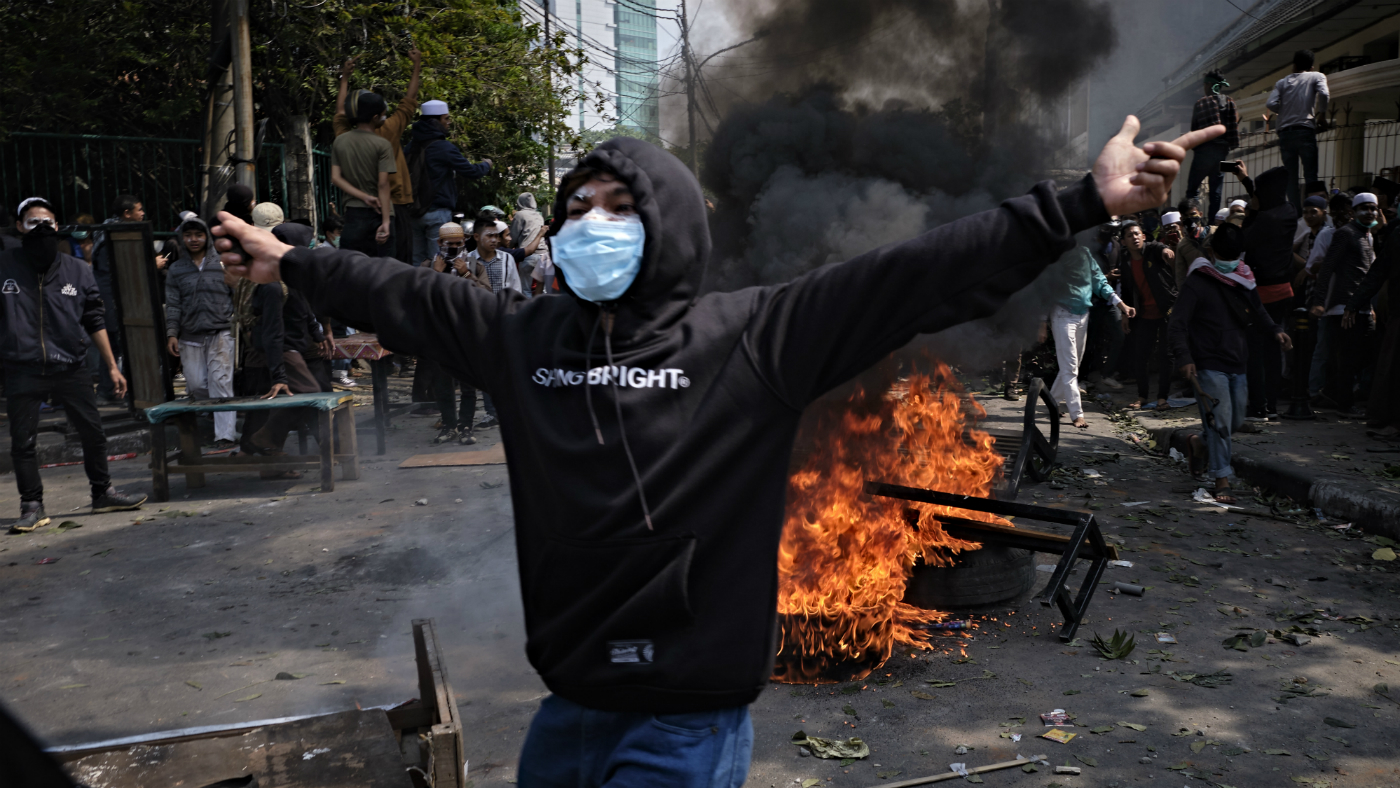How Indonesia’s post-election protests turned deadly
Riots erupt across Jakarta as incumbent president Joko Widodo declared winner of last month’s polls

A free daily email with the biggest news stories of the day – and the best features from TheWeek.com
You are now subscribed
Your newsletter sign-up was successful
At least six people have been killed and a further 200 injured in mass protests across the Indonesian capital of Jakarta, after the country’s election commission confirmed that President Joko Widodo has won a second term in office.
Final official results from last month’s election shows that Widodo, of the Indonesian Democratic Party of Struggle (PDI-P),secured 55.5% of the vote, compared with 44.5% for his rival, Prabowo Subianto, the commission said on Tuesday.
The Guardian reports that supporters of Prabowo - leader of the Great Indonesia Movement Party (Gerindra) - “clashed with security forces and set fire to a police dormitory and vehicles in the capital” following the announcement, which was made in the early hours in an attempt to minimise the risk of violence.
The Week
Escape your echo chamber. Get the facts behind the news, plus analysis from multiple perspectives.

Sign up for The Week's Free Newsletters
From our morning news briefing to a weekly Good News Newsletter, get the best of The Week delivered directly to your inbox.
From our morning news briefing to a weekly Good News Newsletter, get the best of The Week delivered directly to your inbox.
Dozens of protesters have been detained by security forces.
Prabowo, a retired general who has been accused of human rights abuses, claims that “widespread cheating” occurred during the 17 April election “but has provided no credible evidence to back up his allegations”, Al Jazeera reports.
Nevertheless, his campaign team say they will lodge a formal challenge to the result with the Constitutional Court.
How did the vote unfold?
A free daily email with the biggest news stories of the day – and the best features from TheWeek.com
More than 192 million people were eligible to vote in the presidential and general elections, the BBC reports. The day after they went to the polls, the elections commission warned that owing to the vast number of votes cast, it might take 35 days to complete the official tally of the results, adds the Straits Times.
Widodo and Prabowo had previously fought a bitter presidential election campaign in 2014, when the latter also challenged the result after losing.
This time around, Widodo fought a campaign that highlighted his administration’s “progress in poverty reduction and improving Indonesia’s inadequate infrastructure with new ports, toll roads, airports and mass rapid transit”, says The Daily Telegraph. But he has also drawn criticism for failing to address past human rights abuses and widespread corruption.
Prabowo, meanwhile, has been described as a “Trumpian” figure, according to ABC News. The opposition leader has been accused of cosying up to hard-line Islamic groups in Indonesia, which is the largest Muslim-majority nation on Earth and has struggled in recent years with Isis-linked extremist insurgencies.
He is alleged to have signed a deal to promote a conservative-Islamist agenda if he took power, and is banned from entering the US on the grounds of suspected human rights abuses.
Widodo comfortably led opinion polls going into the election. All the same, when early exit polls also predicted a Widodo victory, Prabowo declared the election fraudulent and proclaimed himself the rightful president of Indonesia.
Why are people protesting?
Announcing the final vote count results this week, the election supervisory agency dismissed claims of electoral fraud, citing a lack of evidence. The finding backs up judgements by independent observers that the election was free and fair.
Challenging the commission’s verdict, a member of Prabowo’s team said: “We won’t give up in the face of this injustice, cheating, lies and these actions against democracy.”
In the run-up to the release of the elections results, authorities had tightened security in anticipation of potential civil unrest and “detained dozens of militant Islamists suspected of planning attacks to create mayhem during demonstrations”, reports Reuters. The elections commission office was also barricaded with razor wire.
The BBC reports that the subsequent protests in Jakarta “started peacefully” but quickly turned violent, with “cars set on fire and firecrackers thrown at police” by “white-robed protesters”.
Local TV crews captured footage of a paramilitary police dormitory being set ablaze, while police were filmed using tear gas, rubber bullets and water cannons against protesters.
Following reports that a man had been fatally shot by officers, National Police spokesperson Dedi Prasetyo said: “We are still checking, but I need to reiterate that police officers were not equipped with live bullets.”
What next?
Prabowo has three days to lodge his appeal with the Constitutional Court, which then has a further 14 days to make a decision.
With further unrest expected across the capital, more than 30,000 troops have been deployed, and a number of governments offices, schools, shopping centres and businesses have been closed as a precautionary measure, according to Time magazine.
The magazine adds that social media “will be blocked in parts of the country” to stop the spread of so-called fake news in the wake of the commission announcement.
The Jakarta Post warns that many opposition supporters will “seek any opportunity to avenge Prabowo’s humiliation and they believe he cannot be wrong”.
“Many of them will never accept their idol’s defeat,” the newspaper adds. “They will not hesitate to go to prison just to defend Prabowo.”